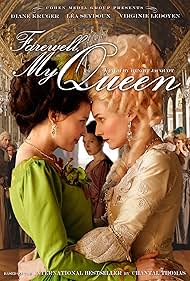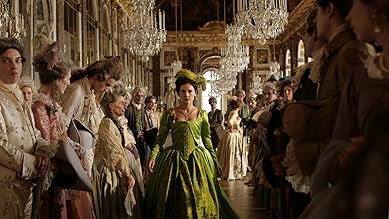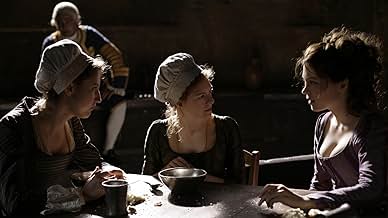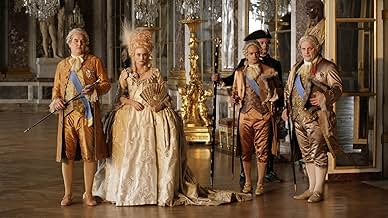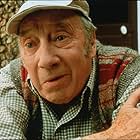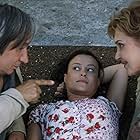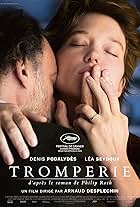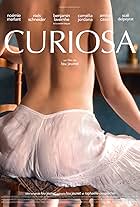IMDb RATING
6.2/10
9.2K
YOUR RATING
A look at the platonic relationship between Marie Antoinette and one of her female readers during the first days of the French Revolution.A look at the platonic relationship between Marie Antoinette and one of her female readers during the first days of the French Revolution.A look at the platonic relationship between Marie Antoinette and one of her female readers during the first days of the French Revolution.
- Awards
- 6 wins & 12 nominations
Julie-Marie Parmentier
- La servante Honorine Aubert
- (as Julie-Marie Parmentier de la Comédie Française)
Hervé Pierre
- L'abbé Hérissé
- (as Hervé Pierre de La Comédie Française)
- Director
- Writers
- All cast & crew
- Production, box office & more at IMDbPro
Storyline
Did you know
- TriviaIn this movie, Diane Kruger speaks French with a German/Austrian accent - which is undoubtedly how the Austrian-born Marie Antoinette would have spoken herself.
- GoofsOn several occasions when soldiers are marching through the main and side gates of Versailles, and also when Sidonie goes to Le Petite Trianon for the first time and falls into a puddle, you can clearly see the very 21st century anti-terrorism concrete security barriers and bollards flanking the gates.
- Quotes
Agathe-Sidonie Laborde: In a way, Your Majesty, you're asking me to go as bait.
La reine Marie Antoinette: An ugly word for a pretty mouth!
Agathe-Sidonie Laborde: Words are all I possess. I wield them well.
- ConnectionsReferenced in Parole de cinéaste: Benoît Jacquot (2017)
Featured review
For the next few years, it must be assumed that any film featuring a popular uprising will attract lazy comparisons to the Arab Spring. The wild waters of revolution run swift in Benoit Jacquot's "Farewell, My Queen", set in the days of July, 1789. Over a wet week in France, starving Parisians storm the symbol of state tyranny, the Bastille, seizing guns and ammunition. Protesters issue a list of demands, calling for the beheadings of nearly 300 influential figures. The de facto signs of regime change are everywhere. Dead rats float in the Grand Canal in Versaille; mosquitoes terrorize the members of the Royal household. Marie Antoinette (Diane Kruger), the Queen of France, however, has escapism on her mind – she sits in bed, skim-reading the latest fashion pages.
In this task, she is aided by a number of ladies-in-waiting and her reader, Sidonie Laborde (Lea Seydoux). The young woman is called to run to the palace library and return with books and plays she reads aloud to the queen. We learn she is a member of the queen's inner circle and somewhat infatuated with her employer. She performs her duties with a mixture of fear, envy and respect. When the stench of revolution is impossible to ignore, she is told she will be guided to safety. Understandably, she feels more than a little betrayed when the queen orders her to impersonate a fleeing aristocrat, Gabrielle de Polignac, who will accompany her, dressed as a servant. If she is captured, Laborde risks death, while Polignac will abscond to safety.
This could all be familiar territory – Sofia Coppola's "Marie Antoinette" (2006) took a distinctly sweet-toothed approach to the French Revolution, imprisoning Kirsten Dunst behind tiers of artisan cakes. In Coppola's film, the French royals behaved like party-goers on an episode of MTV's "My Super Sweet 16". "Farewell, My Queen", which is based on a novel by Chantal Thomas, isn't confection of the same variety. This dimly lit and low budget film marks the end of the fantasy world of Versailles, its gilded halls, jeweled furniture and costumed courtiers. The Royal staff bow and curtsy at every available opportunity – in their spare time, they trade gossip about the private indiscretions of their employers and idly speculate the future of post-revolutionary France.
Unfortunately, the inner workings of the court of Versailles simply aren't any match for the layered politics that define teenage life on "My Super Sweet 16". While Coppola's film was candy floss masquerading as history, "Farewell, My Queen" succeeds in laboring every aspect of daily life at the Royal court. We are told, time and time again, there lurks intrigue behind every palace wall – most of it remains frustratingly off screen. At one point, I found myself thinking Laborde's chores were no different from the experiences of any gap year student – and considerably less hedonistic.
The end, when it arrives, is all too predictable. As members of the royal household are attacked on the streets of Paris, the occupants of Versaille decide to flee. As the royals leave for the last time, their carriages bursting with furniture and jewels, the staff is told "the King will now check the temperature of the throne room". Ice-cold, I would imagine. Not unlike Jacquot's French revolution.
In this task, she is aided by a number of ladies-in-waiting and her reader, Sidonie Laborde (Lea Seydoux). The young woman is called to run to the palace library and return with books and plays she reads aloud to the queen. We learn she is a member of the queen's inner circle and somewhat infatuated with her employer. She performs her duties with a mixture of fear, envy and respect. When the stench of revolution is impossible to ignore, she is told she will be guided to safety. Understandably, she feels more than a little betrayed when the queen orders her to impersonate a fleeing aristocrat, Gabrielle de Polignac, who will accompany her, dressed as a servant. If she is captured, Laborde risks death, while Polignac will abscond to safety.
This could all be familiar territory – Sofia Coppola's "Marie Antoinette" (2006) took a distinctly sweet-toothed approach to the French Revolution, imprisoning Kirsten Dunst behind tiers of artisan cakes. In Coppola's film, the French royals behaved like party-goers on an episode of MTV's "My Super Sweet 16". "Farewell, My Queen", which is based on a novel by Chantal Thomas, isn't confection of the same variety. This dimly lit and low budget film marks the end of the fantasy world of Versailles, its gilded halls, jeweled furniture and costumed courtiers. The Royal staff bow and curtsy at every available opportunity – in their spare time, they trade gossip about the private indiscretions of their employers and idly speculate the future of post-revolutionary France.
Unfortunately, the inner workings of the court of Versailles simply aren't any match for the layered politics that define teenage life on "My Super Sweet 16". While Coppola's film was candy floss masquerading as history, "Farewell, My Queen" succeeds in laboring every aspect of daily life at the Royal court. We are told, time and time again, there lurks intrigue behind every palace wall – most of it remains frustratingly off screen. At one point, I found myself thinking Laborde's chores were no different from the experiences of any gap year student – and considerably less hedonistic.
The end, when it arrives, is all too predictable. As members of the royal household are attacked on the streets of Paris, the occupants of Versaille decide to flee. As the royals leave for the last time, their carriages bursting with furniture and jewels, the staff is told "the King will now check the temperature of the throne room". Ice-cold, I would imagine. Not unlike Jacquot's French revolution.
- socialmedia-437-956449
- Aug 14, 2012
- Permalink
- How long is Farewell, My Queen?Powered by Alexa
Details
- Release date
- Countries of origin
- Official sites
- Languages
- Also known as
- Tạm Biệt, Nữ Hoàng Của Tôi
- Filming locations
- Production companies
- See more company credits at IMDbPro
Box office
- Gross US & Canada
- $1,597,998
- Opening weekend US & Canada
- $72,100
- Jul 15, 2012
- Gross worldwide
- $6,366,835
- Runtime1 hour 40 minutes
- Color
- Sound mix
- Aspect ratio
- 2.35 : 1
Contribute to this page
Suggest an edit or add missing content

